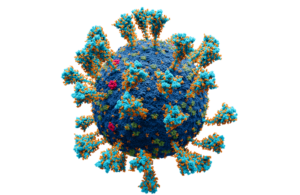
SARS-CoV-2 image courtesy of Wikimedia Commons
The antibody cocktails from Regeneron (NSDQ:REGN) and Eli Lilly (NYSE:LLY) may provide less protection against the Omicron COVID-19 variant than earlier circulating variants.
Independent researchers at the Fred Hutchinson Cancer Research Center (Seattle) concluded that bamlanivimab and etesevimab had a decrease in protection against Omicron, according to The Wall Street Journal.
Omicron could be more resistant to SARS-CoV-2 antibodies than “all the other major variants,” surmised Jesse Bloom, a virologist at the Fred Hutchinson Cancer Research Center, in an interview with Science.
Regeneron released a statement with similar conclusions about its REGEN-COV treatment. While noting that there are “no direct data” pertaining to Omicron’s resistance to monoclonal antibodies or vaccine-induced antibodies, Regeneron stated that earlier in vitro studies and structural modeling indicate that the Omicron variant may resist both. The company is overseeing additional studies to analyze the impact of the Omicron variant against its REGEN-COV therapy.
Regeneron has a pipeline of multiple additional antibodies that may offer substantial protection against the Omicron variant.
The company plans on releasing additional data before the end of the year.
Pfizer (NYSE:PFE) and Merck (NYSE:MRK) have stated that they expect their COVID-19 antivirals to remain effective against the Omicron variant.